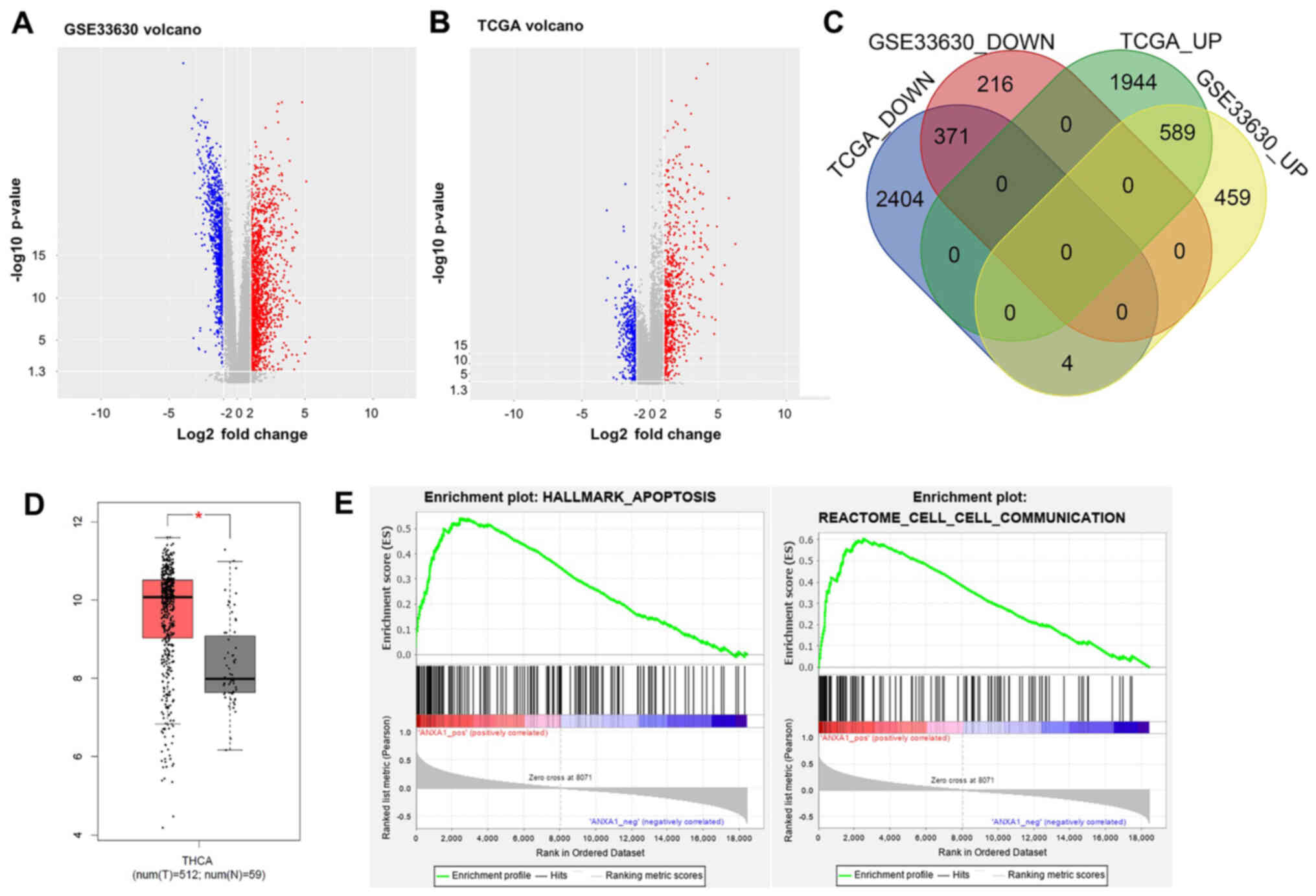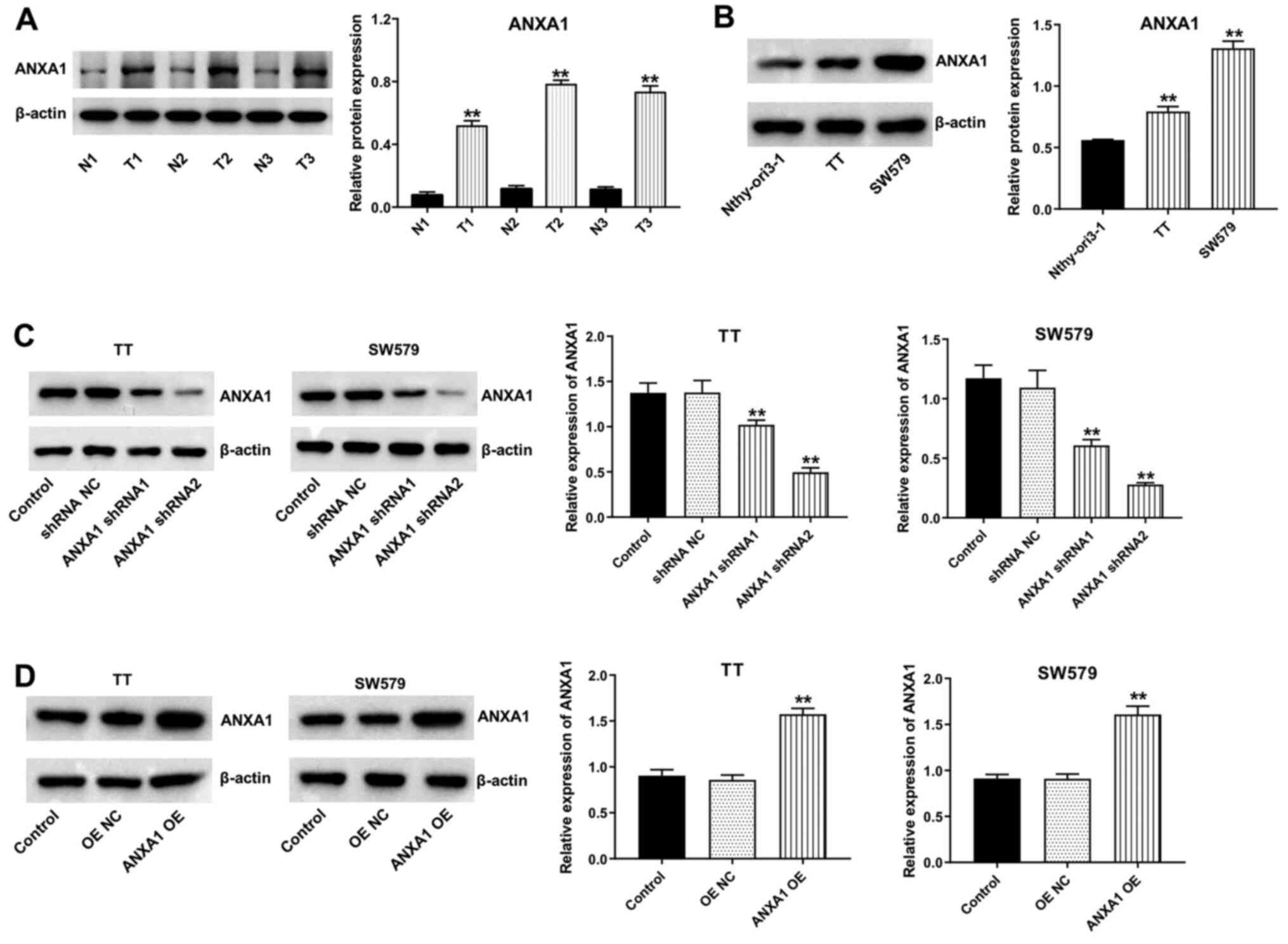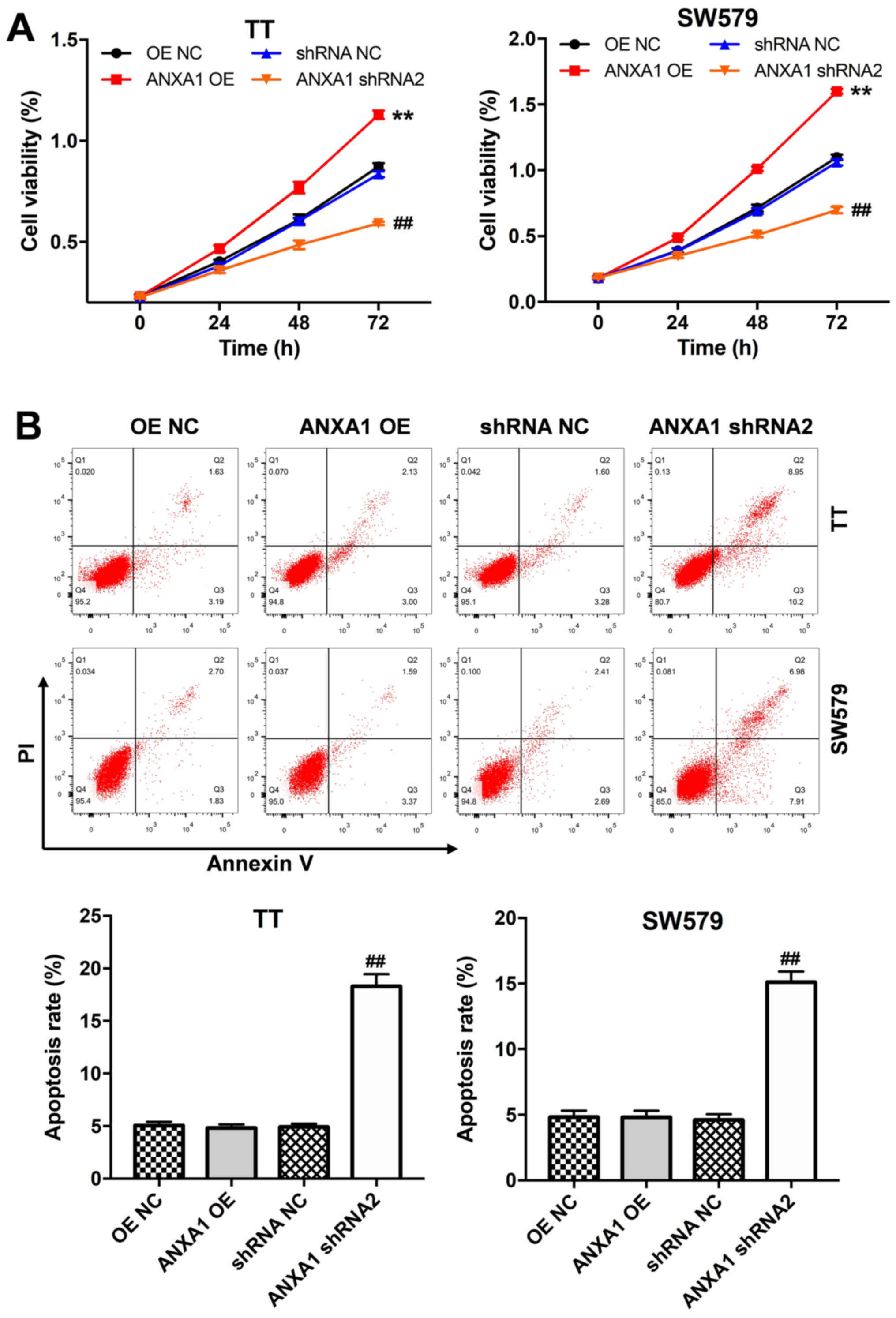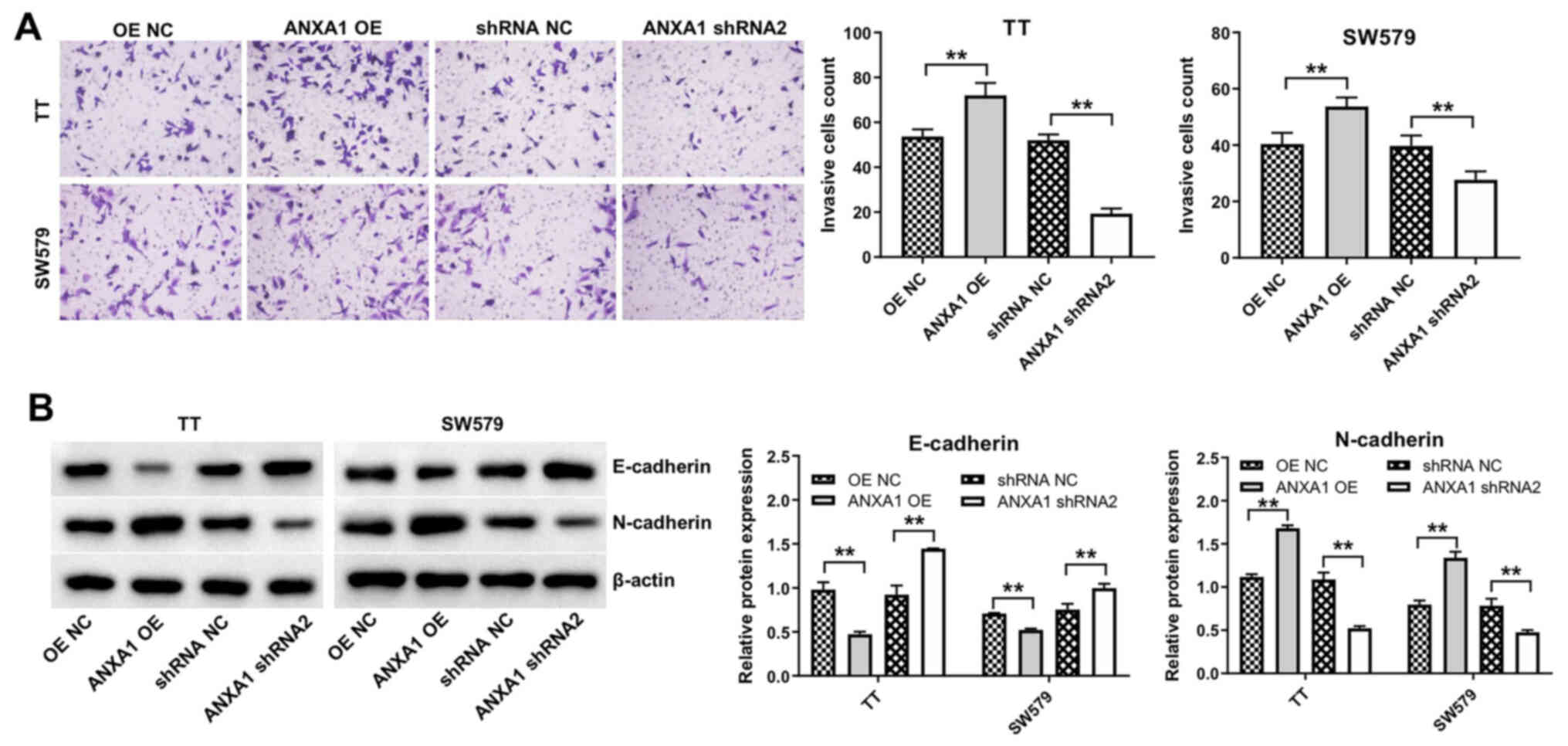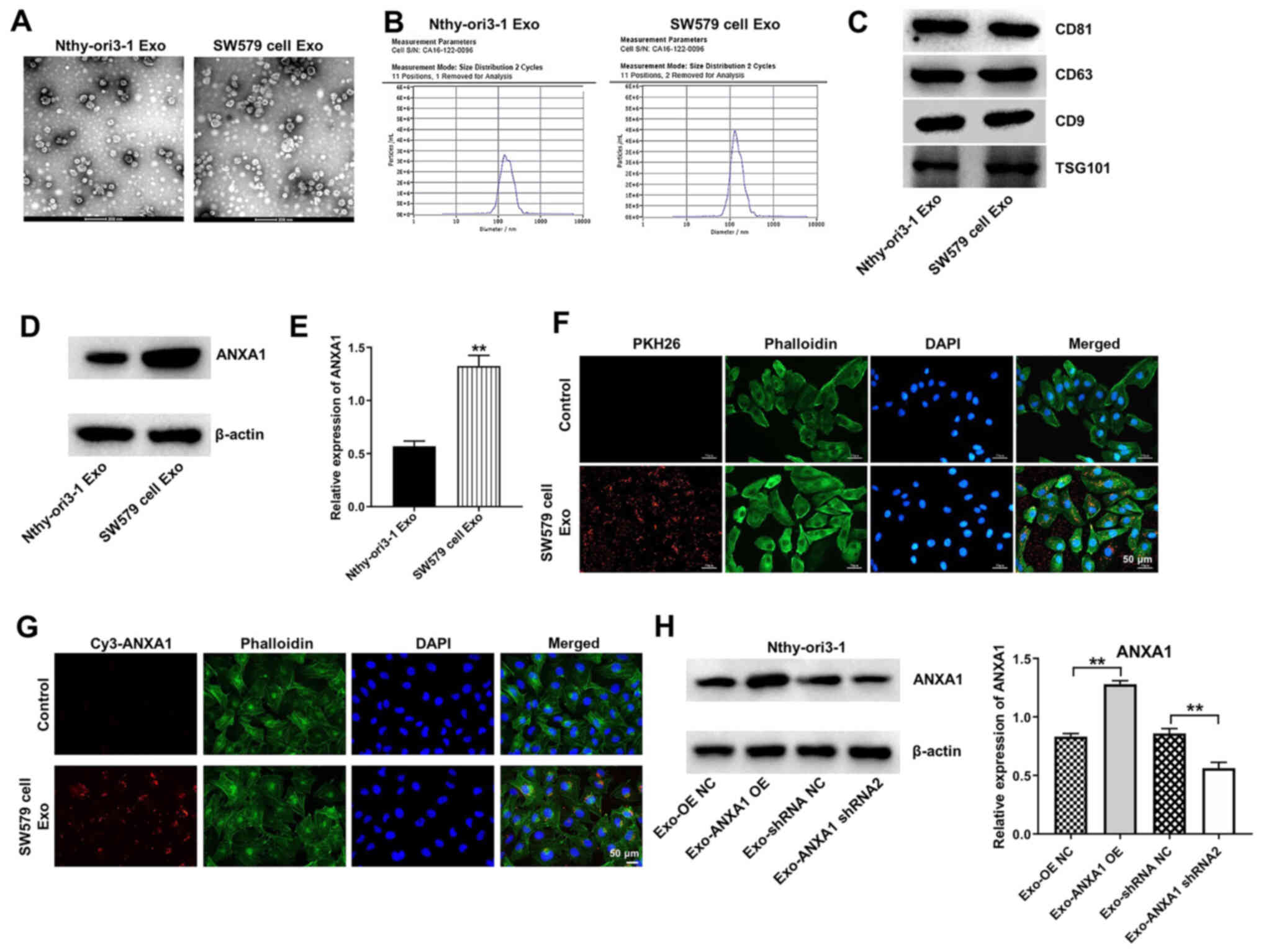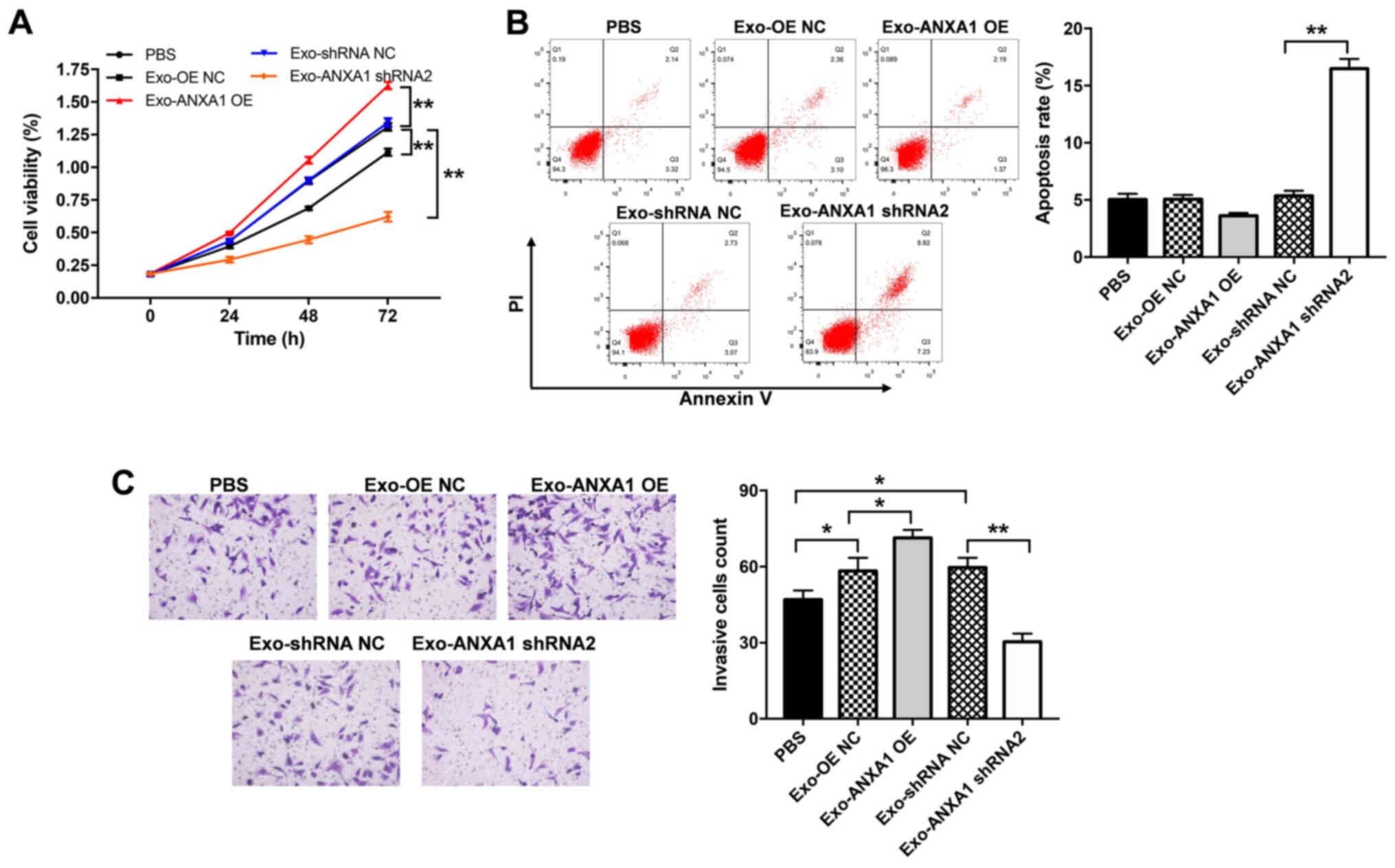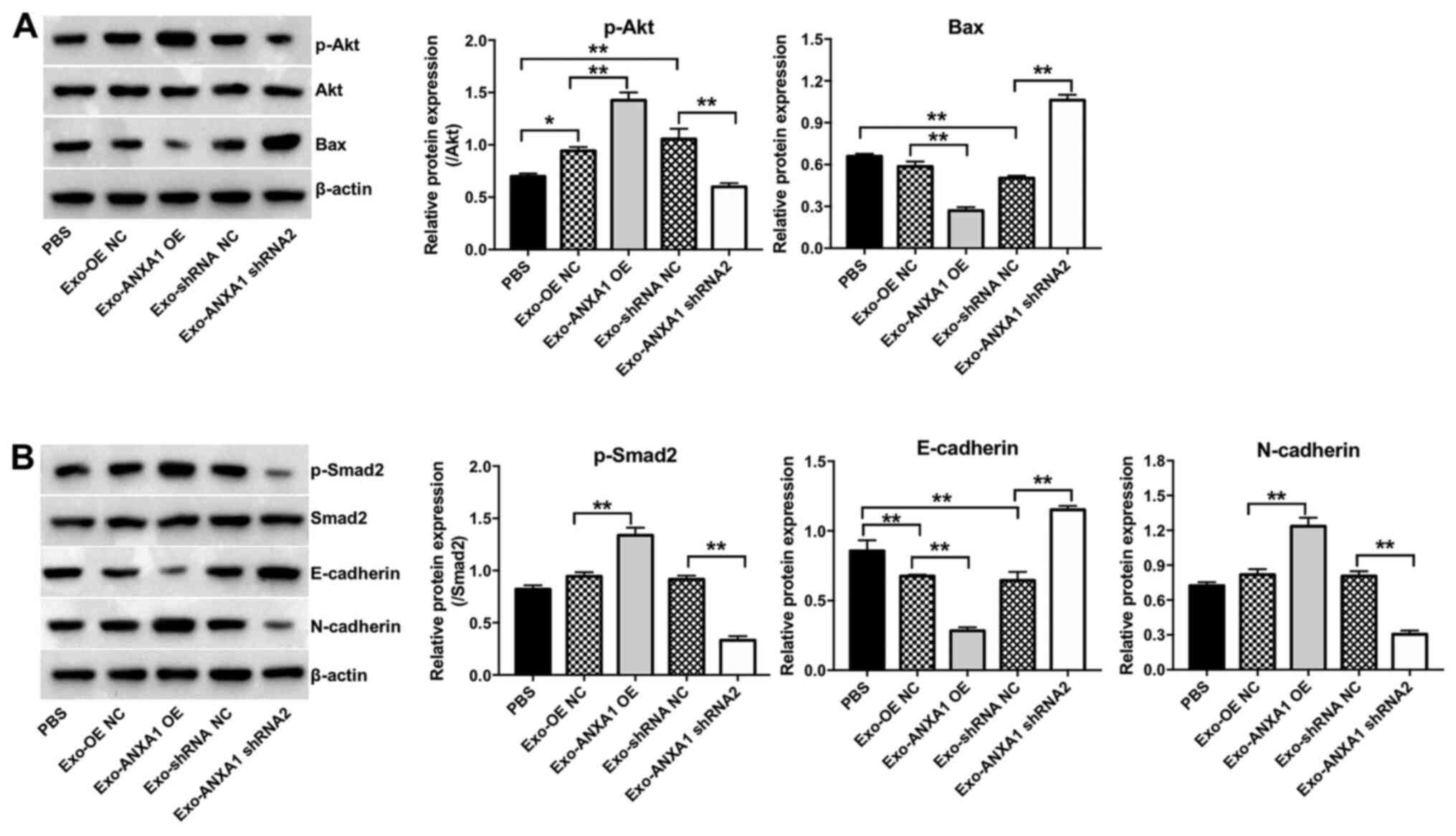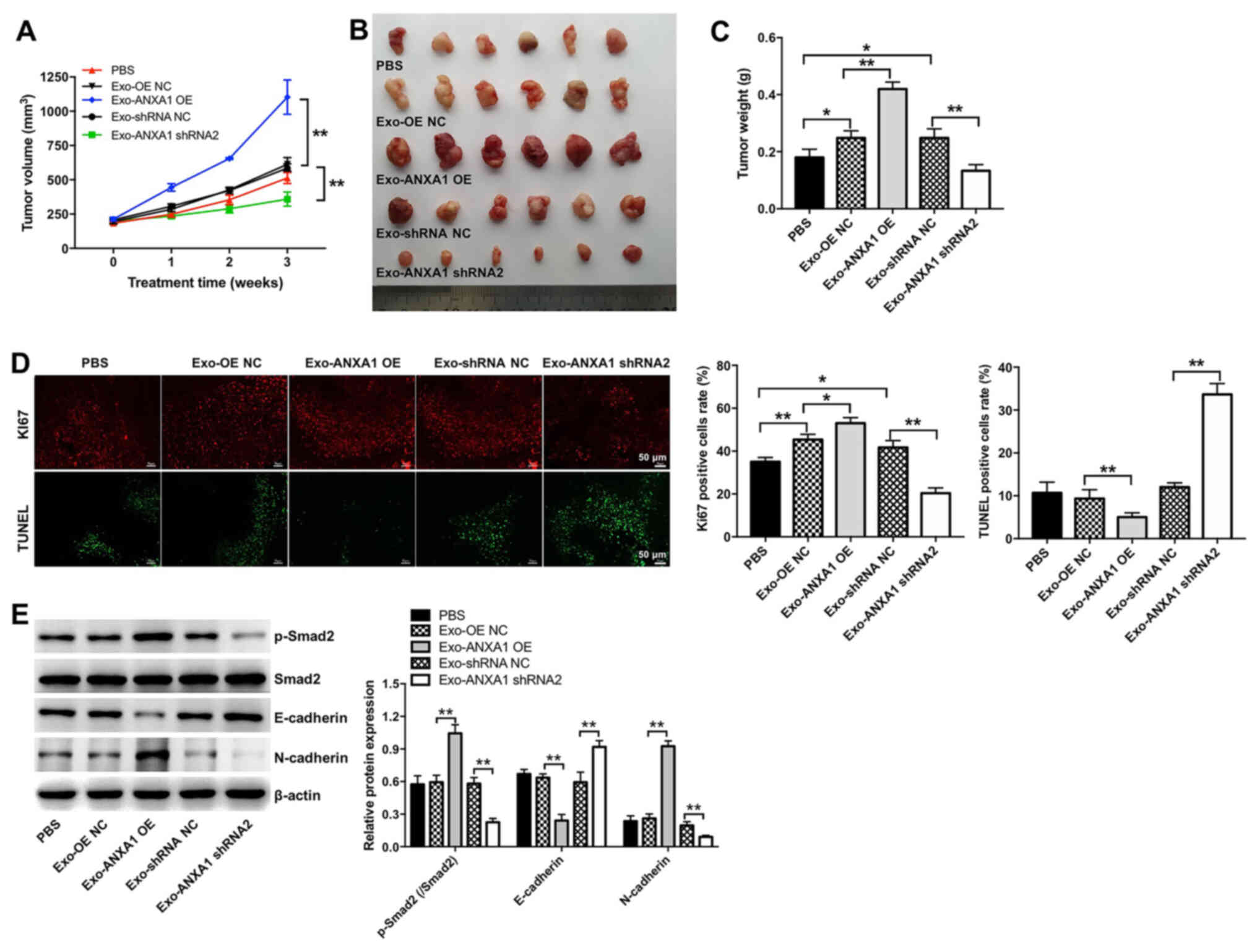|
1
|
Ancker OV, Krüger M, Wehland M, Infanger M
and Grimm D: Multikinase Inhibitor Treatment in Thyroid Cancer. Int
J Mol Sci. 21:212019. View Article : Google Scholar
|
|
2
|
Siegel RL, Miller KD and Jemal A: Cancer
Statistics, 2017. CA Cancer J Clin. 67:7–30. 2017. View Article : Google Scholar
|
|
3
|
Haugen BR: 2015 American Thyroid
Association Management Guidelines for Adult Patients with Thyroid
Nodules and Differentiated Thyroid Cancer: What is new and what has
changed? Cancer. 123:372–381. 2017. View Article : Google Scholar
|
|
4
|
Zheng X, Wang S, Hong S, Liu S, Chen G,
Tang W, Zhao Y, Gao H and Cha B: CXCR4/RhoA signaling pathway is
involved in miR-128-regulated proliferation and apoptosis of human
thyroid cancer cells. Int J Clin Exp Pathol. 10:9213–9222.
2017.PubMed/NCBI
|
|
5
|
Chmielik E, Rusinek D, Oczko-Wojciechowska
M, Jarzab M, Krajewska J, Czarniecka A and Jarzab B: Heterogeneity
of Thyroid Cancer. Pathobiology. 85:117–129. 2018. View Article : Google Scholar
|
|
6
|
Schmid KW: Problem areas of tumour
classifications - thyroid carcinomas. Verh Dtsch Ges Pathol.
91:57–65. 2007.In German.
|
|
7
|
Hong CM, Ahn BC, Jeong SY, Lee SW and Lee
J: Distant metastatic lesions in patients with differentiated
thyroid carcinoma. Clinical implications of radioiodine and FDG
uptake Nucl Med (Stuttg). 52:121–129. 2013.
|
|
8
|
Qiu K, Xie Q, Jiang S and Lin T: miR-98-5p
promotes apoptosis and inhibits migration and cell growth in
papillary thyroid carcinoma through Bax/Caspase-3 by HMGA2. J Clin
Lab Anal. 34:e230442020. View Article : Google Scholar
|
|
9
|
Dralle H, Machens A, Basa J, Fatourechi V,
Franceschi S, Hay ID, Nikiforov YE, Pacini F, Pasieka JL and
Sherman SI: Follicular cell-derived thyroid cancer. Nat Rev Dis
Primers. 1:150772015. View Article : Google Scholar : PubMed/NCBI
|
|
10
|
Guo F, Fu Q, Wang Y and Sui G: Long
non-coding RNA NR2F1-AS1 promoted proliferation and migration yet
suppressed apoptosis of thyroid cancer cells through regulating
miRNA-338-3p/CCND1 axis. J Cell Mol Med. 23:5907–5919. 2019.
View Article : Google Scholar : PubMed/NCBI
|
|
11
|
Correa P and Chen VW: Endocrine gland
cancer. Cancer. 75(Suppl): 338–352. 1995. View Article : Google Scholar : PubMed/NCBI
|
|
12
|
Paunovic IR, Sipetic SB, Zoric GV, Diklic
AD, Savic DV, Marinkovic J and Zivaljevic VR: Survival and
prognostic factors of anaplastic thyroid carcinoma. Acta Chir Belg.
115:62–67. 2015. View Article : Google Scholar : PubMed/NCBI
|
|
13
|
Stanković V, Borojević N, Dzodić R and
Golubicić I: Medullary carcinoma of the thyroid gland: Effect of
postoperative transcutaneous radiotherapy on local control and
results of treatment. Acta Chir Iugosl. 50:125–130. 2003.In
Serbian.
|
|
14
|
Kalluri R: The biology and function of
exosomes in cancer. J Clin Invest. 126:1208–1215. 2016. View Article : Google Scholar : PubMed/NCBI
|
|
15
|
Tai YL, Chen KC, Hsieh JT and Shen TL:
Exosomes in cancer development and clinical applications. Cancer
Sci. 109:2364–2374. 2018. View Article : Google Scholar : PubMed/NCBI
|
|
16
|
Kalluri R and LeBleu VS: The biology,
function, and biomedical applications of exosomes. Science.
367:3672020. View Article : Google Scholar
|
|
17
|
Zhang L and Yu D: Exosomes in cancer
development, metastasis, and immunity. Biochim Biophys Acta Rev
Cancer. 1871:455–468. 2019. View Article : Google Scholar : PubMed/NCBI
|
|
18
|
Wu F, Li F, Lin X, Xu F, Cui RR, Zhong JY,
Zhu T, Shan SK, Liao XB, Yuan LQ, et al: Exosomes increased
angiogenesis in papillary thyroid cancer microenvironment. Endocr
Relat Cancer. 26:525–538. 2019. View Article : Google Scholar : PubMed/NCBI
|
|
19
|
Bizzarro V, Belvedere R, Migliaro V,
Romano E, Parente L and Petrella A: Hypoxia regulates ANXA1
expression to support prostate cancer cell invasion and
aggressiveness. Cell Adhes Migr. 11:247–260. 2017. View Article : Google Scholar
|
|
20
|
Vecchi L, Alves Pereira, Zóia M, Goss
Santos T, de Oliveira Beserra A, Colaço Ramos CM, França Matias
Colombo B, Paiva Maia YC, Piana de Andrade V, Teixeira Soares Mota
S, Gonçalves de Araújo T, et al: Inhibition of the AnxA1/FPR1
autocrine axis reduces MDA-MB-231 breast cancer cell growth and
aggressiveness in vitro and in vivo. Biochim Biophys Acta Mol Cell
Res. 1865:1368–1382. 2018. View Article : Google Scholar : PubMed/NCBI
|
|
21
|
Zhuang C, Wang P, Sun T, Zheng L and Ming
L: Expression levels and prognostic values of annexins in liver
cancer. Oncol Lett. 18:6657–6669. 2019.PubMed/NCBI
|
|
22
|
Gibbs LD and Vishwanatha JK: Prognostic
impact of AnxA1 and AnxA2 gene expression in triple-negative breast
cancer. Oncotarget. 9:2697–2704. 2017. View Article : Google Scholar
|
|
23
|
Belvedere R, Novizio N, Pessolano E, Tosco
A, Eletto D, Porta A, Campiglia P, Perretti M, Filippelli A and
Petrella A: Heparan sulfate binds the extracellular Annexin A1 and
blocks its effects on pancreatic cancer cells. Biochem Pharmacol.
182:1142522020. View Article : Google Scholar
|
|
24
|
Zhao X, Ma W, Li X, Li H, Li J, Li H and
He F: ANXA1 enhances tumor proliferation and migration by
regulating epithelial-mesenchymal transition and IL-6/JAK2/STAT3
pathway in papillary thyroid carcinoma. J Cancer. 12:1295–1306.
2021. View Article : Google Scholar
|
|
25
|
Belvedere R, Bizzarro V, Popolo A, Dal
Piaz F, Vasaturo M, Picardi P, Parente L and Petrella A: Role of
intracellular and extracellular annexin A1 in migration and
invasion of human pancreatic carcinoma cells. BMC Cancer.
14:9612014. View Article : Google Scholar : PubMed/NCBI
|
|
26
|
Tomás G, Tarabichi M, Gacquer D, Hébrant
A, Dom G, Dumont JE, Keutgen X, Fahey TJ III, Maenhaut C and
Detours V: A general method to derive robust organ-specific gene
expression-based differentiation indices: Application to thyroid
cancer diagnostic. Oncogene. 31:4490–4498. 2012. View Article : Google Scholar : PubMed/NCBI
|
|
27
|
Dom G, Tarabichi M, Unger K, Thomas G,
Oczko-Wojciechowska M, Bogdanova T, Jarzab B, Dumont JE, Detours V
and Maenhaut C: A gene expression signature distinguishes normal
tissues of sporadic and radiation-induced papillary thyroid
carcinomas. Br J Cancer. 107:994–1000. 2012. View Article : Google Scholar : PubMed/NCBI
|
|
28
|
Subramanian A, Tamayo P, Mootha VK,
Mukherjee S, Ebert BL, Gillette MA, Paulovich A, Pomeroy SL, Golub
TR, Lander ES, et al: Gene set enrichment analysis: A
knowledge-based approach for interpreting genome-wide expression
profiles. Proc Natl Acad Sci USA. 102:15545–15550. 2005. View Article : Google Scholar : PubMed/NCBI
|
|
29
|
Hu C, Zhou Y, Liu C and Kang Y: A novel
scoring system for gastric cancer risk assessment based on the
expression of three CLIP4 DNA methylation-associated genes. Int J
Oncol. 53:633–643. 2018.PubMed/NCBI
|
|
30
|
Feng J, Lu SS, Xiao T, Huang W, Yi H, Zhu
W, Fan S, Feng XP, Li JY, Yu ZZ, et al: ANXA1 Binds and Stabilizes
EphA2 to Promote Nasopharyngeal Carcinoma Growth and Metastasis.
Cancer Res. 80:4386–4398. 2020. View Article : Google Scholar : PubMed/NCBI
|
|
31
|
Novizio N, Belvedere R, Pessolano E, Tosco
A, Porta A, Perretti M, Campiglia P, Filippelli A and Petrella A:
Annexin A1 Released in Extracellular Vesicles by Pancreatic Cancer
Cells Activates Components of the Tumor Microenvironment, through
Interaction with the Formyl-Peptide Receptors. Cells. 9:92020.
View Article : Google Scholar
|
|
32
|
Bebelman MP, Smit MJ, Pegtel DM and Baglio
SR: Biogenesis and function of extracellular vesicles in cancer.
Pharmacol Ther. 188:1–11. 2018. View Article : Google Scholar : PubMed/NCBI
|
|
33
|
Whiteside TL: Tumor-Derived Exosomes and
Their Role in Cancer Progression. Adv Clin Chem. 74:103–141. 2016.
View Article : Google Scholar : PubMed/NCBI
|
|
34
|
Cheng TY, Wu MS, Lin JT, Lin MT, Shun CT,
Huang HY, Hua KT and Kuo ML: Annexin A1 is associated with gastric
cancer survival and promotes gastric cancer cell invasiveness
through the formyl peptide receptor/extracellular signal-regulated
kinase/integrin beta-1-binding protein 1 pathway. Cancer.
118:5757–5767. 2012. View Article : Google Scholar : PubMed/NCBI
|
|
35
|
Yoshida K, Tsuda M, Matsumoto R, Semba S,
Wang L, Sugino H, Tanino M, Kondo T, Tanabe K and Tanaka S:
Exosomes containing ErbB2/CRK induce vascular growth in
premetastatic niches and promote metastasis of bladder cancer.
Cancer Sci. 110:2119–2132. 2019. View Article : Google Scholar : PubMed/NCBI
|
|
36
|
Hannafon BN, Gin AL, Xu YF, Bruns M,
Calloway CL and Ding WQ: Metastasis-associated protein 1 (MTA1) is
transferred by exosomes and contributes to the regulation of
hypoxia and estrogen signaling in breast cancer cells. Cell Commun
Signal. 17:132019. View Article : Google Scholar : PubMed/NCBI
|
|
37
|
Steinhaeuser SS, Morera E, Budkova Z,
Schepsky A, Wang Q, Rolfsson O, Riedel A, Krueger A, Hilmarsdottir
B, Maelandsmo GM, et al: ECM1 secreted by HER2-overexpressing
breast cancer cells promotes formation of a vascular niche
accelerating cancer cell migration and invasion. Lab Invest.
100:928–944. 2020. View Article : Google Scholar : PubMed/NCBI
|
|
38
|
Wei S, Peng L, Yang J, Sang H, Jin D, Li
X, Chen M, Zhang W, Dang Y and Zhang G: Exosomal transfer of
miR-15b-3p enhances tumorigenesis and malignant transformation
through the DYNLT1/Caspase-3/Caspase-9 signaling pathway in gastric
cancer. J Exp Clin Cancer Res. 39:322020. View Article : Google Scholar : PubMed/NCBI
|
|
39
|
Chen X, Zhou J, Li X and Wang X, Lin Y and
Wang X: Exosomes derived from hypoxic epithelial ovarian cancer
cells deliver microRNAs to macrophages and elicit a tumor-promoted
phenotype. Cancer Lett. 435:80–91. 2018. View Article : Google Scholar
|
|
40
|
Peinado H, Alečković M, Lavotshkin S,
Matei I, Costa-Silva B, Moreno-Bueno G, Hergueta-Redondo M,
Williams C, García-Santos G, Ghajar C, et al: Melanoma exosomes
educate bone marrow progenitor cells toward a pro-metastatic
phenotype through MET. Nat Med. 18:883–891. 2012. View Article : Google Scholar : PubMed/NCBI
|















